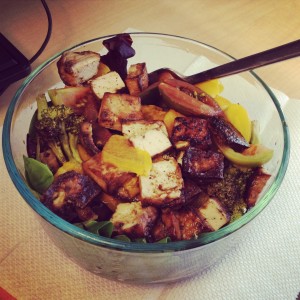Happy Thursday! How are we all feeling today?
I had the TV on while working the other day, and this commercial gave me an idea for a post. This one always cracks me up:
It’s the way the guy runs away after telling the cow what he wants to tell her. Love it.
Me and lactose are A-okay. If you’ve been reading my blog awhile, you’ve probably gathered that I’m a little obsessed with yogurt. It’s a weird day if I don’t end up having yogurt at some point. However, I know that this is not the case for everyone. In fact, one might argue that it’s downright weird for humans to drink cow’s milk. It’s kind of like when you say a word over and over until it starts to sound ridiculous. Once human babies are weaned off breast milk, they don’t tend to go back to it, and having never even been a member of the bovine species (at least not in this life, if past lives are a thing), what business do I have, really, for consuming something intended for baby cows?
Where the issue gets complicated (for me, anyway) is the deliciousness of yogurt. And cheese. And cappuccino. And my tree-nut allergy that takes vegan nut-based products off the menu. And the fact that a lot of these dairy-free products can be highly processed and may contain flavors and texturizing agents I’d really rather not consume. Making one’s own non-dairy milk is an option, of course, but this may not be realistic for everyone.
Nutrition is a factor too. Dairy is one of the top sources of dietary calcium, a mineral important for bone health as well as maintaining muscle and nerve function.
When first navigating lactose intolerance or deciding not to consume dairy products, finding alternative sources of calcium becomes an issue. Current Recommended Dietary Allowances (RDA) for calcium for adults and children over age 4 generally range from 1000-1200 mg per day, though pregnancy, lactation, or certain medical conditions or use of medications may impact calcium metabolism and needs. A lot of people think supplements and fortified foods are their only options. While those certainly have their place to help address gaps in the diet, there are also lots of non-dairy foods that are natural sources of calcium. For example:
- Tofu 350 mg per ½ cup
- Sardines, canned, with bones 325 mg per 3 ounces
- Chia seeds 300 mg per 1.5 ounces
- Collard greens 210 mg per ½ cup
- Bok choi 190 mg per ½ cup
- Canned salmon 181 mg per 3 ounces
- Figs 135mg per 5 figs
- White beans 120 mg per ½ cup
- Spinach 99 mg per ½ cup
- Almonds 93 mg per ¼ cup
- Kale 90 mg per 1 cup, raw
- Sesame seeds 51 mg per tablespoon
If you need a comparison, keep in mind that one 8-ounce cup of cow’s milk provides about 300 mg of calcium. Also, to help your body efficiently absorb that calcium, make sure you’re consuming adequate vitamin D, whether through food sources or a combination of food and supplementation.
What are your go-to calcium sources?
This post has been part of another Running with Spoons Thinking Out Loud link party, where randomness is the name of the game. Thanks to Amanda for hosting.


